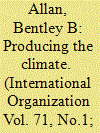| Srl | Item |
| 1 |
ID:
162515


|
|
|
|
|
| Summary/Abstract |
Existing theories predict that the rise of China will trigger a hegemonic transition and the current debate centers on whether or not the transition will be violent or peaceful. This debate largely sidesteps two questions that are central to understanding the future of international order: how strong is the current Western hegemonic order and what is the likelihood that China can or will lead a successful counterhegemonic challenge? We argue that the future of international order is shaped not only by material power but also by the distribution of identity across the great powers. We develop a constructivist account of hegemonic transition and stability that theorizes the role of the distribution of identity in international order. In our account, hegemonic orders depend on a legitimating ideology that must be consistent with the distribution of identity at the level of both elites and masses. We map the distribution of identity across nine great powers and assess how this distribution supports the current Western neoliberal democratic hegemony. We conclude that China is unlikely to become the hegemon in the near term.
|
|
|
|
|
|
|
|
|
|
|
|
|
|
|
|
| 2 |
ID:
152330


|
|
|
|
|
| Summary/Abstract |
This paper argues that the climate came to take on a geophysical rather than a bioecological form in global governance because it emerged from a dynamic, interactive process between states and scientists. In the 1950s, state agencies, especially elements of the US military, steered and accelerated the development of the geophysical sciences, which set the discursive frame within which climate politics now plays out. In the 1990s, scientists and IO experts responded to states' requests to study carbon sinks by expanding the climate to include new greenhouse gases and land-use practices. Drawing on Science and Technology Studies as well as discursive theories of global governance, I theorize object constitution as a process of co-production in which states steer the development of scientific knowledge and scientists assemble epistemic objects. This contingent interaction of political and scientific actors shapes the form and content of global governance objects. The argument extends and challenges the epistemic communities literature and theories of the global governance life cycle that focus on how problems end up on the agenda of states rather than the processes of problem construction.
|
|
|
|
|
|
|
|
|
|
|
|
|
|
|
|
| 3 |
ID:
157546


|
|
|
|
|
| Summary/Abstract |
Climate change moved rapidly up the international political agenda between 1979 and 1988. What explains this shift? Existing explanations focus on how an international epistemic community built a scientific consensus that informed state interests by reducing uncertainty. However, in 1988 scientists actually heightened uncertainty about the future consequences of climate change by depicting it as a security threat “second only to a global nuclear war.” To account for this, I integrate insights from science and technology studies and securitization theory. In doing so, I theorize how scientists speak the grammar of security and construct existential threats. I argue that scientists catalyzed political action in the climate case by drawing on ideas about time, technology, and humanity's place in the universe. I conduct a discourse analysis of key scientific texts in the 1980s to uncover the frames and discourses scientists used to place climate change on the international political agenda.
|
|
|
|
|
|
|
|
|
|
|
|
|
|
|
|
| 4 |
ID:
161632


|
|
|
|
|
| Summary/Abstract |
This article reads Alexander Wendt’s Quantum Mind and Social Science as a work of social theory. A crucial element of any social theory is its account of action or agency. I explore Wendt’s quantum theory of social action by analysing two issues. First, Wendt argues that the success of quantum decision theory implies that human behaviour is quantum and therefore is likely to have been produced by a quantum brain. I interrogate this assumption and argue that it rests on the claim that mathematical descriptions map human and social reality in a realistic way. Second, Wendt combines quantum measurement, quantum linguistics, and quantum decision theory into a contextual account of human agency. On this image, social action arises out of connections to interwoven phenomenological, social, and temporal contexts. I suggest that this account of agency is appealing in some ways, but that social theorists have been working on a similar image outside the physics constraint for some time. I conclude that while insights from quantum social science should be an essential component of any post-classical social theory, the task of theorising social agency should not take place exclusively under the constraints of quantum physics or other mathematical descriptions.
|
|
|
|
|
|
|
|
|
|
|
|
|
|
|
|